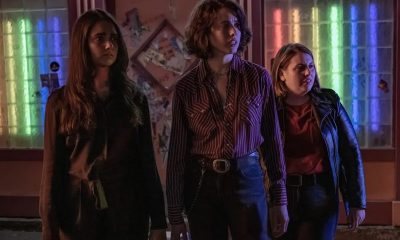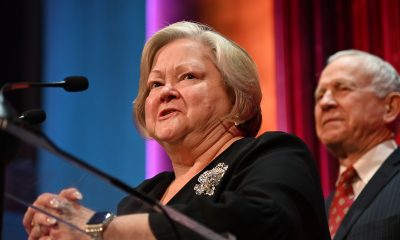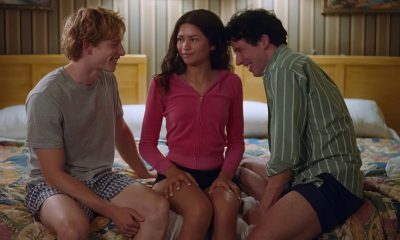Movies
End-of-year lineup offers holiday feast for queer movie lovers
Gripping ‘Saltburn’ features stellar performances
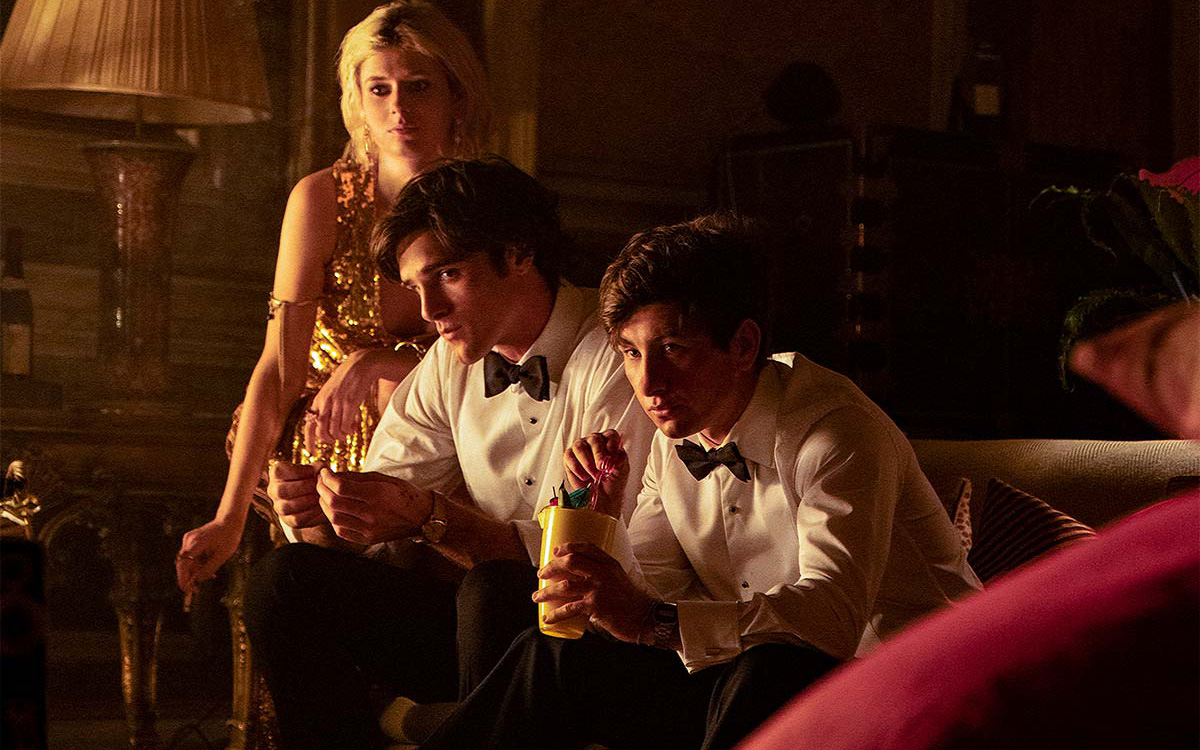
Looking back, we’d have to say that 2023 has been good to fans of outstanding cinema. From summer’s existential one-two punch of “Barbie” and “Oppenheimer” to an iconic filmmaker’s delivery of a new masterwork with “Killers of the Flower Moon,” we’ve already seen enough top-notch artistry on the big screen to know there are going to be some tight races in this year’s awards season.
But don’t start making your Oscar predictions yet, because there’s still more to come, including Ridley Scott’s Joaquin Phoenix-starring “Napoleon” and Yorgas Lanthimos’ darkly fantastical sci-fi comedy “Poor Things,” not to mention Timothèe Chalamet in a purple frock coat as “Wonka.” And as our annual Blade Holiday Roundup of current-and-upcoming movies clearly shows, even if most of them aren’t exactly “seasonal” in terms of tone or subject matter, there are sure to be quite a few queer (or queer-related) titles in the mix to make the competition even more interesting.
In fact, a potential awards juggernaut is already in theaters: SALTBURN, the second film from Oscar-winning writer/director Emerald Fennell (“Promising Young Woman”), which premiered at this year’s Telluride Festival and represents the latest ascension in the rise of two sensational young actors. Jacob Elordi (“Euphoria,” “Priscilla”) is likely more familiar to many viewers – his blend of impossibly good looks and authentic talent have gained him a lot of attention for a range of reasons, and both those qualities are put to good use here. But it’s Barry Keoghan (“Dunkirk,” “The Banshees of Inisherin”) who is the real breakout star of this twisted, darkly comedic psychological thriller as Oliver Quick, a working class boy who earns a scholarship to Oxford and becomes infatuated with rich-but-sensitive fellow student Felix (Elordi). Invited to spend the summer at his boy crush’s family estate (the “Saltburn” of the title), he gradually becomes enmeshed within their privileged dynamic – and to say anything more than that would be to spoil the “can’t look away” fun that makes this savage, stylish, and sexy mindf*ck of a movie into something you can’t wait to watch multiple times. Also starring Rosamund Pike, Richard E. Grant, Alison Oliver, Archie Madekwe, and Carey Mulligan in a delicious supporting turn, it goes into wide release on Nov. 22.
Another title now in theaters is NEXT GOAL WINS, from Oscar-winner and auteur-on-the-rise Taika Waititi (“Jojo Rabbit,” “Thor: Ragnarok”), in which the uniquely whimsical New Zealand filmmaker presents his take on the “true sports” genre. It’s a comedic-but-inspirational underdog tale centered on the American Samoa soccer team, which after a brutal 31-0 FIFA loss in 2001 hired a down-on-his-luck maverick coach to turn themselves around in hopes of qualifying for the World Cup. Waititi’s infectiously winning blend of quirky absurdism and heartfelt sentiment makes this an automatic must-see, even if its handling of a trans character – real-life soccer player Jaiyah Saelua (played by Samoan “third gender” actor Kaimana), considered by FIFA as the first trans woman to compete in a World Cup qualifier game – has met with mixed response. Still, it’s one of two current films boasting the return of the exquisite Michael Fassbender (the other is David Fincher’s “The Killer,” which should also be on your list), so we think it’s worth seeing anyway; that way you can make up your own mind about the controversy over its approach to trans inclusion. Also starring Oscar Kightley, David Fane, Rachel House, Beulah Koale, Uli Latukefu, Semu Filipo, and Lehi Falepapalangi, with appearances by Will Arnett and Elisabeth Moss.
Also currently on big screens is Todd Haynes’ MAY DECEMBER, which reunites the revered queer indie film pioneer with longtime muse Julianne Moore and casts her opposite Natalie Portman in the true-story-inspired tale of an actress who travels to Georgia to meet a woman – notorious for an infamous tabloid romance, years before – that she is set to play in a movie. Loosely suggested by the real-life story of Mary Kay Fualaau, who was imprisoned for having sex with an underage pupil and later married him, it’s steeped in the kind of uncomfortable ethical-and-emotional danger zone that is a hallmark of Haynes’s best work, so it’s no surprise that it brings out the best in his two lead actresses. The buzziest performance in the film, however, comes from “Riverdale” star Charles Melton, who has drawn raves as Moore’s husband. Distributed by Netflix, it will stream on their platform starting Dec. 1 – but why wait when you can see it in theaters now?
Bringing a double appeal for movie buffs who are also lovers of classical music is MAESTRO, going into limited release Nov. 22 before it begins streaming on Netflix Dec. 20, which stars Bradley Cooper – who also wrote and directed – as legendary conductor/composer Leonard Bernstein and documents (among other things) his relationships with both wife Felicia Montealegre (Carey Mulligan) and longtime male partner David Oppenheim (Matt Bomer). Though initially plagued with criticism over Cooper’s use of a prosthetic nose to play the Jewish Bernstein, endorsement from the late musical genius’s family and positive reviews of his performance have helped that conversation fade into the background, and the biopic – which also stars Maya Hawke, Sarah Silverman, Michael Urie, Brian Klugman, Gideon Glick, and Miriam Shor – looks poised to be a winner.
Releasing in limited theaters Dec. 1 and expanding wide on Dec. 8 is EILEEN, adapted from Ottessa Moshfegh’s acclaimed 2015 debut novel, finally hitting screens nearly a year after a splashy debut at Sundance. Set in Boston of the mid 1960s, it tracks the relationship that develops when a young woman working at a juvenile detention center is drawn in by the allure of a new and glamorous older colleague (Anne Hathaway), who may also be drawing her into something much more dangerous than a workplace flirtation. With a screenplay by the author (alongside husband Luke Goebel) and direction by William Oldroyd, it’s been described by co-star Hathaway as “‘Carol’ meets ‘Resevoir Dogs’” – and that’s enough to make it irresistible, as far as we’re concerned.
Coming to Hulu on Dec. 6 is WE LIVE HERE: THE MIDWEST, a documentary from filmmakers Melinda Maerker and David Miller that explores the lives of several LGBTQIA+ families in the American heartland; these include a trans/queer family with five children in Iowa expelled by their church, a gay Black couple with a young daughter facing homophobic and racial prejudice in Nebraska, a gay teacher in Ohio trying to create a safe space for queer students, and a lesbian couple homeschooling their bullied son on a farm in Kansas. Profiling families who struggle to remain part of a region in which they have deep roots, it’s a snapshot of a precarious historical moment in time when anti-queer legislation and sentiment is rapidly multiplying across the country, forcing queer Midwesterners to endure a clash of values as they strive to build lives in the communities they love in the face of mounting discrimination.
Another much-anticipated release comes on Dec. 22 with ALL OF US STRANGERS, the latest effort from “Looking” creator Andrew Haigh – whose 2011 “Weekend” places high on the list of all-time great queer romance films – starring top-shelf UK thespians Andrew Scott (“Sherlock,” “Pride,” “Fleabag”) and Paul Mescal (“Aftersun,” “The Lost Daughter”) in a ghostly romantic fantasy loosely adapted from Taichi Yamada’s 1987 novel “Strangers.” In it, a melancholy Londoner (Scott) strikes up a relationship with a mysterious neighbor (Mescal) through a chance encounter that leaves him increasingly preoccupied with memories of his past; returning to his suburban childhood home for a visit, he finds it occupied by his parents (Claire Foy, Jaime Bell), who seem to be living in it exactly as they were when they died there, three decades before. An ethereal meditation on grief, nostalgia, and, ultimately, love – both the romantic and familial kinds – that leans more into the metaphysical than the supernatural as it weaves its disquieting tale and is somehow more haunting because of it, it’s already a fixture in the pre-awards-season chatter. Put this one on your list in bold letters.
On Christmas Day, if you’re looking for that perfect “big event” family movie to take in after the presents have been unwrapped and the feast devoured, you couldn’t ask for a more perfect candidate than THE COLOR PURPLE, which is not a remake of Steven Spielberg’s 1985 movie of Alice Walker’s 1982 novel – though Spielberg, along with the original film’s co-star Oprah Winfrey and its composer Quincy Jones, as well as Walker herself, is one of its producers – but rather the film adaptation of the Tony-winning 2005 Broadway musical version of the book. Confused? No need to be, though we must admit the film’s advertising campaign may have contributed to that feeling by all-but-erasing any clue that it’s a musical. But with a superstar cast headlined by Fantasia Barrino, Taraji P. Henson, Danielle Brooks, Colman Domingo, Corey Hawkins, Halle Bailey, and H.E.R., along with a proven score of powerful songs by Brenda Russell, Allee Willis, and Stephen Bray, it will all make sense after you sit back and let yourself be immersed in what’s sure to be a reverent and heartfelt celebration of Black culture, history, and heritage, told through the experience of an uneducated and impoverished Black queer woman in rural Georgia of the early 1900s, that fully honors the transcendent spirit of its timeless source material.
And lastly, speaking of Christmas, this December won’t disappoint the sentimentalists out there for whom the season wouldn’t be the season without one or two of those much-ridiculed but secretly adored holiday romances, a genre which – after years of clinging to a stubborn “straights only” policy – has finally blossomed with a whole queer-inclusive subgenre of its own. In fact, Hallmark – the channel that, let’s face it, is pretty much synonymous with the whole phenomenon – has no less than 40 heartfelt Christmas love stories slated for broadcast, and among those are at least three which will be must-sees for queer fans: CHRISTMAS ON CHERRY LANE (premiering Dec. 9), starring out actor Jonathan Bennett (“Mean Girls”) and Vincent Rodriguez III as a gay couple trying to expand their family among two other intertwined stories; FRIENDS & FAMILY CHRISTMAS (premiering Dec. 17), featuring Ali Liebert and Humberley Gonzalez (“Ginny and Georgia”) as a pair of lesbians who get set up on a date for the holidays and find themselves connecting more than they expected; and though it centers on a straight romance, CATCH ME IF YOU CLAUS (premiering Nov. 23) has sure-fire queer appeal thanks to its out-and-proud star, “King of Hallmark” actor Luke Macfarlane (“Bros”), playing it straight as Santa’s son, who meets an aspiring news anchor (Italia Ricci) just in time to spice things up for the holidays.
Go ahead and watch them all, we won’t judge you. Happy holidays and happy viewing!
Movies
It’s game, set, and mismatch in unfulfilling ‘Challengers’
Not quite a bisexual love story for the ages
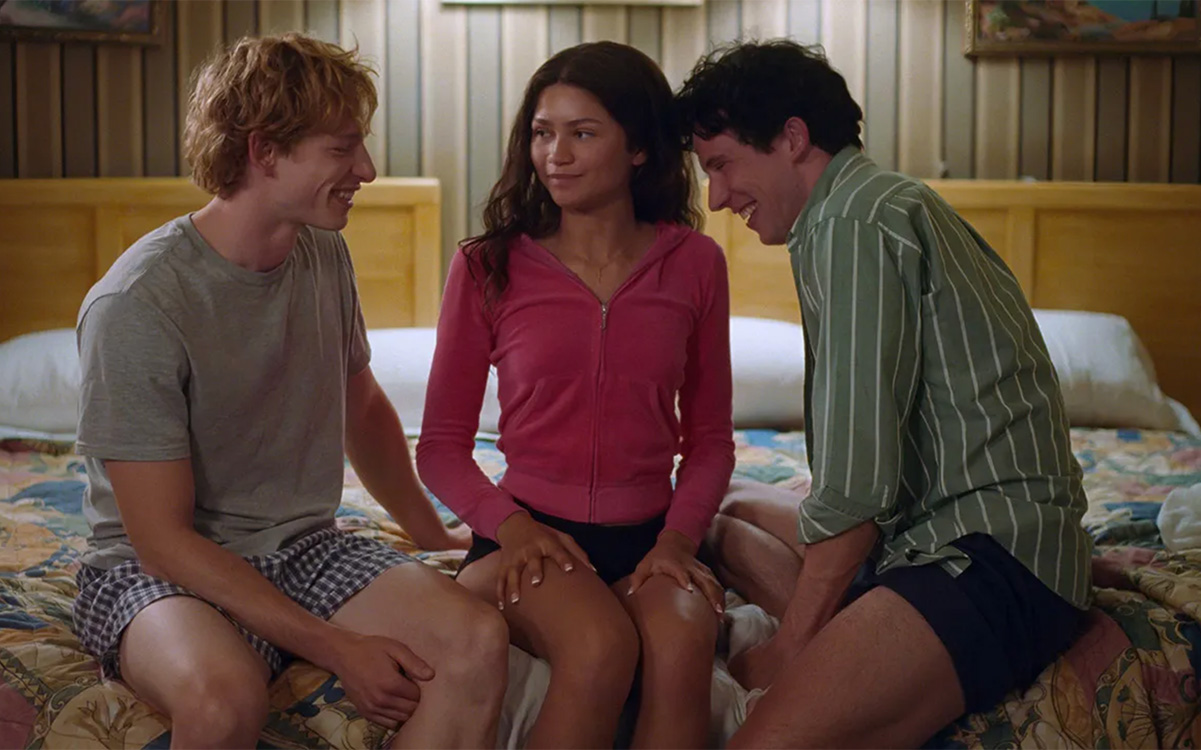
For months now, most of the buzz around Luca Guadagnino’s newest film – “Challengers,” starring Zendaya as a professional tennis coach caught in an ongoing romantic triangle with a pair of male rival players – has been about how “bisexual” it would be.
After all, this was the man that brought us “Call Me By Your Name,” and even if the Italian filmmaker’s work has not always been that queer in focus, this premise was begging for it; and when the trailers started to drop, heavily laden with imagery that made the bisexual subtext blatantly obvious, the speculation – and the anticipation – only grew.
As it turns out, “Challengers” wasn’t teasing us in vain – but it may not even matter, because after spending two hours and 10 minutes with these characters, it’s hard to imagine any viewer, whether straight, bi, or a total “Kinsey 6,” wanting to feel represented by them.
Told in a non-linear patchwork format, Guadagnino’s movie – penned by Justin Kuritzkes – chronicles the complicated relationship that develops when two high school tennis champs, boyhood friends Patrick and Art (Josh O’Connor and Mike Faist, respectively), encounter high-profile pro prospect Tashi (Zendaya) at the US Open juniors. Infatuated at first sight as much by her prowess at the game as by her looks or personality, they woo her together, resulting in a steamy but thwarted three-way experience that ends with her promising her phone number to the one who wins the next day’s match.
More than a decade later, Tashi and Art are a married, wealthy power couple with a child; they’ve risen to fame after Tashi, sidelined by injury into a career as a world-class coach, has helped Art rise to international prowess, while Patrick, who originally won the challenge to become Tashi’s lover, has sunken to the level of low-ranked has-been after brief professional success. Art has hit a slump in his upward trajectory, so to freshen up his game, Tashi enters him into a small-time “challenger” tournament where Patrick, now scraping by on his meager winnings from lower circuit events such as this one, is a “wild card” entry. The rekindling of old rivalries and complex feelings between this intertwined trio of “players” results in a final competition in which the outcome has more to do with unrequited personal passions than it does with tennis.
Ostensibly both a sports movie and a romantic drama, it’s a film that wastes no time in tying its two themes together for an exploration of how the competitive instinct that might be essential to one can be a major obstacle when it comes to the other. Thanks to its back-and-forth time structure, we are rushed through all the necessary twists and turns of a 13-year romantic triad quickly enough to recognize immediately that the need to “win” supersedes every other desired outcome for these three people; more than that, in the broad strokes that emphasize the quick deterioration of their affections in the pursuit of the “game” (a word we use here both literally and figuratively), it becomes obvious that none of them are capable of recognizing how much influence their lust for victory has over their relationships with each other. To put it bluntly, in an era when polyamory has gained traction as a legitimate variation on the spectrum of human commitment, “Challengers” reads a little bit like a primer on how NOT to do it right.
That might, of course, be a big part of the point. In a story about professional athletes driven by the urge for victory trying to negotiate the delicate balance of self-respect and selflessness required to maintain a successful romantic partnership – no matter how many partners may be involved – it’s probably an inescapable element of the plot that there would be a struggle to reconcile those two conflicting impulses. The trouble is that, here, the three characters involved are so far removed from typical human experience that it becomes difficult to relate to any of them. They operate within a privileged world that is out of reach for most of us, and the conflicts that arise in their triad dynamic mostly arise from pure ego. It’s hard to feel empathy for such individuals, frankly, especially when it’s clear that their own mindset is the greatest obstacle to fulfillment in their lives, both professionally and personally. They’re all spoiled brats, and unrepentantly so.
It’s because of this that “Challengers” comes off as the kind of glossy, old-Hollywood fantasy that is more about wish fulfillment than anything else. Each of its protagonists is impossibly attractive; fit, sexy, and living an enviable life even when they’re struggling just to get by. They are the kind of people many of us wish we could be – and that, ironically, perhaps makes us dislike them all the more.
None of this is the fault of the players, who uniformly give the kind of fully invested performance that illuminates the humanity of their characters beyond negative cliches. Zendaya, never shying from her role as master manipulator in the film’s twisted “long con” romance, makes us feel the visceral need for competition that eclipses her less imperative impulses toward personal connection. O’Connor (“God’s Own Country,” “The Crown”) and Faist (Broadway’s “Dear Evan Hansen,” Spielberg’s “West Side Story”) are not only eminently likable, but present an unvarnished and completely believable chemistry as would-be-lovers who can’t quite get past their self-judgment to embrace the obvious feelings they have for each other. The fact that we believe equally in their impulse toward the dazzlingly self-actualized Zendaya makes their performances all the more stellar. Unfortunately, within the larger context of the film, their appeal is tarnished by our ambivalence toward the dynamic the characters perpetuate between themselves.
And what of their sexuality? Is “Challengers” that rare mainstream movie that vaults over the film industry’s long-lamented “bi erasure” to present a bisexual love story for the ages? Not quite. Even if its ending (spoiler alert!) suggests that the entire movie has been about two men getting over their toxic masculinity to embrace their true feelings for each other, the fact that it never defines that relationship as a queer one and chooses instead to leave it up to our individual interpretation feels like something of a cop out. In the long run, perhaps, it’s a better tactic to avoid labeling its relationships in terms of sexuality, since the cultural “endgame” at stake has arguably more to do with normalizing diversity than amplifying an individual sense of identity – but even so, it can’t be denied that, when “Challengers” reaches its final moment, we’re left with a sense of ambiguity that feels far too “safe,” too much a capitulation to the fragile mainstream sensibility, to advance a sense of acceptance for the “B” in “LGBTQ.” In the end, it’s a movie that stops short of the mark for the sake of the lowest common comfort zone.
Which is why, sadly, we have to set “Challengers” aside as a failed – if well-meaning – attempt at providing visibility for the most traditionally invisible faction of the queer community, instead of the unequivocal validation of bisexual attraction we’re still waiting to see.
Movies
‘Housekeeping for Beginners’ embraces true meaning of family
Another triumph from young filmmaker Goran Stolevski
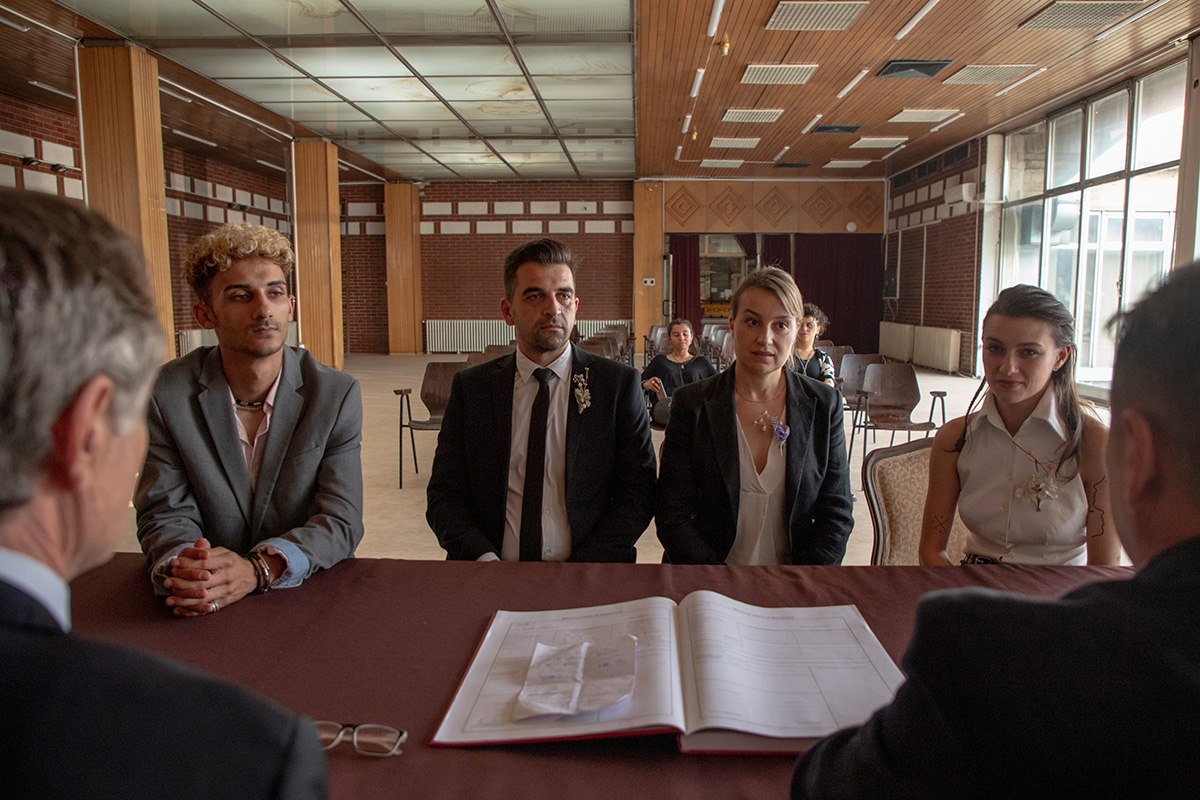
Once upon a time in America, queer people sometimes adopted their lovers as their “children” so that they could be legally bound together as family.
That’s not a revelation, though some queer younglings may be shocked to learn this particular nugget of hidden history, nor is it a call to political awareness in an election year when millions are actively working to roll back our freedoms. We bring it up merely as a sort of context for the world that provides the setting in “Housekeeping for Beginners,” the winner of the Queer Lion prize at 2023’s Venice Film Festival, which opened in limited U.S. theaters on April 5 and expanded for a wider release last weekend.
Written and directed by Goran Stolevski – a Macedonian-born Australian filmmaker whose two previous films, “You Won’t Be Alone” and “Of An Age,” both released in 2022, each met with critical acclaim – and submitted (unsuccessfully) as the official Oscar entry for International Feature from the Republic of North Macedonia, it’s a movie about what it means to be “family,” which touches on the political while placing its focus on the personal – in other words, on lived experience rather than ideological argument – and, in the process, drives home some very important existential warnings at a time when things could go either way.
Set in the North Macedonian capital of Skopje, it centers on social worker Dita (Anamaria Marinca), a middle-aged lesbian, whose house is a safe haven for a collection of outcasts. First and foremost is her girlfriend Suada (Alina Serban), a single mother of Romani heritage, but the “chosen family” in the household also includes Suada’s daughters, teenaged Vanesa (Mia Mustafi) and precocious 5-year-old Mia (Dżada Selim); Dita’s long-term friend Toni (Vladimir Tintor), a middle-aged gay man who works night shifts at a mental hospital; Toni’s new, much-younger boyfriend Ali (Samson Selim); and Elena (Sara Klimoska), an older and more worldly schoolmate of the other girls who serves as a makeshift big sister.
It is, unsurprisingly, a chaotic environment, a sea of revolving situations that largely goes on without Dita’s direct involvement, though she occasionally asserts more authority than she either has or cares to wield. That all changes, however, when Suada is diagnosed with aggressive pancreatic cancer, leading her to extract from her lover the promise that she will be mother to her children when she’s gone.
If you want a spoiler-free experience, you should stop reading now; further discussion of “Housekeeping for Beginners” requires us to reveal that Dita is forced to make good on that promise, even though she’s never had the desire to be a mother, and it’s not just a matter of making sure the kids get all their daily meals and show up for school on time. In North Macedonia, where same-sex relationships are not illegal but are neither granted the validation of lawful protections, the adoption of children requires a woman to have a husband, which means entering into a sham marriage with Toni – who is not quite a 100% onboard, himself – and listing him as the girls’ father. More difficult, perhaps, is gaining the trust of Suada’s two daughters, neither of whom is exactly receptive to the prospect of exchanging their real mother for a half-willing replacement. It’s this challenge that proves most daunting, triggering a crisis that will put every member of this cobbled-together family group to the test if they are to have any hope of hanging on to each other and making it work – something to which Dita finds herself growing deeply committed, despite her initial reticence about taking on the role of default matriarch.
Shot in Stolevski’s accustomed milieu – an intimate, cinema verité style built on handheld camerawork and near-exclusive reliance on close-up framing to capture the awkward blend of comfort and claustrophobia that often accompanies life in a crowded household environment – and leaving most of the expository cultural details, such as the impact of ethnic “caste” and the complicated hierarchy of layers involved in negotiating a peaceful coexistence with “normal” Macedonian society when your domestic and familial structures are anything but “normal”, to be gleaned by context rather than direct explanation. It works, of course; there’s something universally recognizable about the difficulty of “blending in” that helps us bridge the gap even if we don’t quite understand all the fine points as well as we might if we, like Stolevski, had grown up having to deal with them directly.
Even so, there are times when a bit of distance might be missed by audiences in need of a wider scope; it’s hard, after all, to get a palpable sense of space and location when most of what we see onscreen are the upper thirds of whichever cast members happen to be featured in each particular scene. But in case that sounds like a criticism, it’s important to point out that this is part of the film’s magic spell – because by making its physical environment essentially synonymous with its emotional one, Stolevski’s movie delivers its human truth without the unnecessary distraction of learning the ins and outs of a foreign cultural dynamic. The things we need to grasp, we do, without question, even if we don’t quite understand the full context, and what we walk away with in the end is a universally recognizable sense of family, carved in stark relief among a group of people who find it among themselves despite the lack of blood ties or common history to bind them to each other. That makes “Household for Beginners” an unequivocal triumph in one way, at least, because by driving home that hard-to-convey understanding, it manages to underscore the injustice and inhumanity of any world in which the validity of a family is subject to the judgment of cultural bias.
That’s not to say that “Housekeeping” is an unrelenting downer of political messaging. On the contrary, it is lifted by a clear imperative to show the joys of being part of such a family; the humor, the snark, the bright spots that arise even in the darkest moments – all these are amply and aptly portrayed, making sure that we never feel like we are being fed a doom-and-gloom scenario. Rather, we’re being reminded that it’s the visceral happiness that comes from being connected with those we love that matters far more than the rules and judgments of outsiders, which makes the hoops Dita and company have to jump through feel all the more absurd.
Though Stolevski, an Aussie citizen unspooling a narrative based in his country of origin, might not have intended it as such, the message of his film strikes a particular chord in 2024 America. The hardships of Dita and her brood as they try to simply stay together are a clear and pointed warning not to take for granted the hard-won freedoms that we have.
Add to that a superb collection of performances (BAFTA-winner Marinca and first-time actor Selim are standouts among the many), and you have another triumph from a young filmmaker whose reputation only gets more stellar with each effort.
Movies
After 25 years, a forgotten queer classic reemerges in 4K glory
Screwball rom-com ‘I Think I Do’ finds new appreciation

In 2024, with queer-themed entertainment available on demand via any number of streaming services, it’s sometimes easy to forget that such content was once very hard to find.
It wasn’t all that long ago, really. Even in the post-Stonewall ‘70s and ‘80s, movies or shows – especially those in the mainstream – that dared to feature queer characters, much less tell their stories, were branded from the outset as “controversial.” It has been a difficult, winding road to bring on-screen queer storytelling into the light of day – despite the outrage and protest from bigots that, depressingly, still continues to rear its ugly head against any effort to normalize queer existence in the wider culture.
There’s still a long way to go, of course, but it’s important to acknowledge how far we’ve come – and to recognize the efforts of those who have fought against the tide to pave the way. After all, progress doesn’t happen in a vacuum, and if not for the queer artists who have hustled to bring their projects to fruition over the years, we would still be getting queer-coded characters as comedy relief or tragic victims from an industry bent on protecting its bottom line by playing to the middle, instead of the (mostly) authentic queer-friendly narratives that grace our screens today.
The list of such queer storytellers includes names that have become familiar over the years, pioneers of the “Queer New Wave” of the ‘90s like Todd Haynes, Gus Van Sant, Gregg Araki, or Bruce LaBruce, whose work at various levels of the indie and “underground” queer cinema movement attracted enough attention – and, inevitably, notoriety – to make them known, at least by reputation, to most audiences within the community today.
But for every “Poison” or “The Living End” or “Hustler White,” there are dozens of other not-so-well-remembered queer films from the era; mostly screened at LGBTQ film festivals like LA’s Outfest or San Francisco’s Frameline, they might have experienced a flurry of interest and the occasional accolade, or even a brief commercial release on a handful of screens, before slipping away into fading memory. In the days before streaming, the options were limited for such titles; home video distribution was a costly proposition, especially when there was no guarantee of a built-in audience, so most of them disappeared into a kind of cinematic limbo – from which, thankfully, they are beginning to be rediscovered.
Consider, for instance, “I Think I Do,” the 1998 screwball romantic comedy by writer/director Brian Sloan that was screened last week – in a newly restored 4K print undertaken by Strand Releasing – in Brooklyn as the Closing Night Selection of NewFest’s “Queering the Canon” series. It’s a film that features the late trans actor and activist Alexis Arquette in a starring, pre-transition role, as well as now-mature gay heartthrob Tuc Watkins and out queer actor Guillermo Diaz in supporting turns, but for over two decades has been considered as little more than a footnote in the filmographies of these and the other performers in its ensemble cast. It deserves to be seen as much more than that, and thanks to a resurgence of interest in the queer cinema renaissance from younger film buffs in the community, it’s finally getting that chance.
Set among a circle of friends and classmates at Washington, D.C.’s George Washington University, it’s a comedic – yet heartfelt and nuanced – story of love left unrequited and unresolved between two roommates, openly gay Bob (Arquette) and seemingly straight Brendan (Christian Maelen), whose relationship in college comes to an ugly and humiliating end at a Valentine’s Day party before graduation. A few years later, the gang is reunited for the wedding of Carol (Luna Lauren Vélez) and Matt (Jamie Harrold), who have been a couple since the old days. Bob, now a TV writer engaged to a handsome soap opera star (Watkins), is the “maid” of honor, while old gal pals Beth (Maddie Corman) and Sarah (Marianne Hagan), show up to fill out the bridal party and pursue their own romantic interests. When another old friend, Eric (Diaz), shows up with Brendan unexpectedly in tow, it sparks a behind-the-scenes scenario for the events of the wedding, in which Bob is once again thrust into his old crush’s orbit and confronted with lingering feelings that might put his current romance into question – especially since the years between appear to have led Brendan to a new understanding about his own sexuality.
In many ways, it’s a film with the unmistakable stamp of its time and provenance, a low-budget affair shot at least partly under borderline “guerilla filmmaking” conditions and marked by a certain “collegiate” sensibility that results in more than a few instances of aggressively clever dialogue and a storytelling agenda that is perhaps a bit too heavily packed. Yet at the same time, these rough edges give it a raw, DIY quality that not only makes any perceived sloppiness forgivable, but provides a kind of “outsider” vibe that it wears like a badge of honor. Add to this a collection of likable performances – including Arquette, in a winning turn that gets us easily invested in the story, and Maelen, whose DeNiro-ish looks and barely concealed sensitivity make him swoon-worthy while cementing the palpable chemistry between them – and Sloan’s 25-year-old blend of classic Hollywood rom-com and raunchy ‘90s sex farce reveals itself to be a charming, wiser-than-expected piece of entertainment, with an admirable amount of compassion and empathy for even its most stereotypical characters – like Watkins’ soap star, a walking trope of vainglorious celebrity made more fully human than appearances would suggest by the actor’s honest, emotionally intelligent performance – that leaves no doubt its heart is in the right place.
Sloan, remarking about it today, confirms that his intention was always to make a movie that was more than just frothy fluff. “While the film seems like a glossy rom-com, I always intended an underlying message about the gay couple being seen as equals to the straight couple getting married,” he says. “ And the movie is also set in Washington to underline the point.”
He also feels a sense of gratitude for what he calls an “increased interest from millennials and Gen Z in these [classic queer indie] films, many of which they are surprised to hear about from that time, especially the comedies.” Indeed, it was a pair of clips from “his film”I Think I Do” featured on Queer Cinema Archive that “garnered a lot of interest from their followers,” and “helped to convince my distributor to bring the film back” after being unavailable for almost 10 years.
Mostly, however, he says “I feel very lucky that I got to make this film at that time and be a part of that movement, which signaled a sea change in the way LGBTQ characters were portrayed on screen.”
Now, thanks to Strand’s new 4K restoration, which will be available for VOD streaming on Amazon and Apple starting April 19, his film is about to be accessible to perhaps a larger audience than ever before.
Hopefully, it will open the door for the reappearance of other iconic-but-obscure classics of its era and help make it possible for a whole new generation to discover them.



